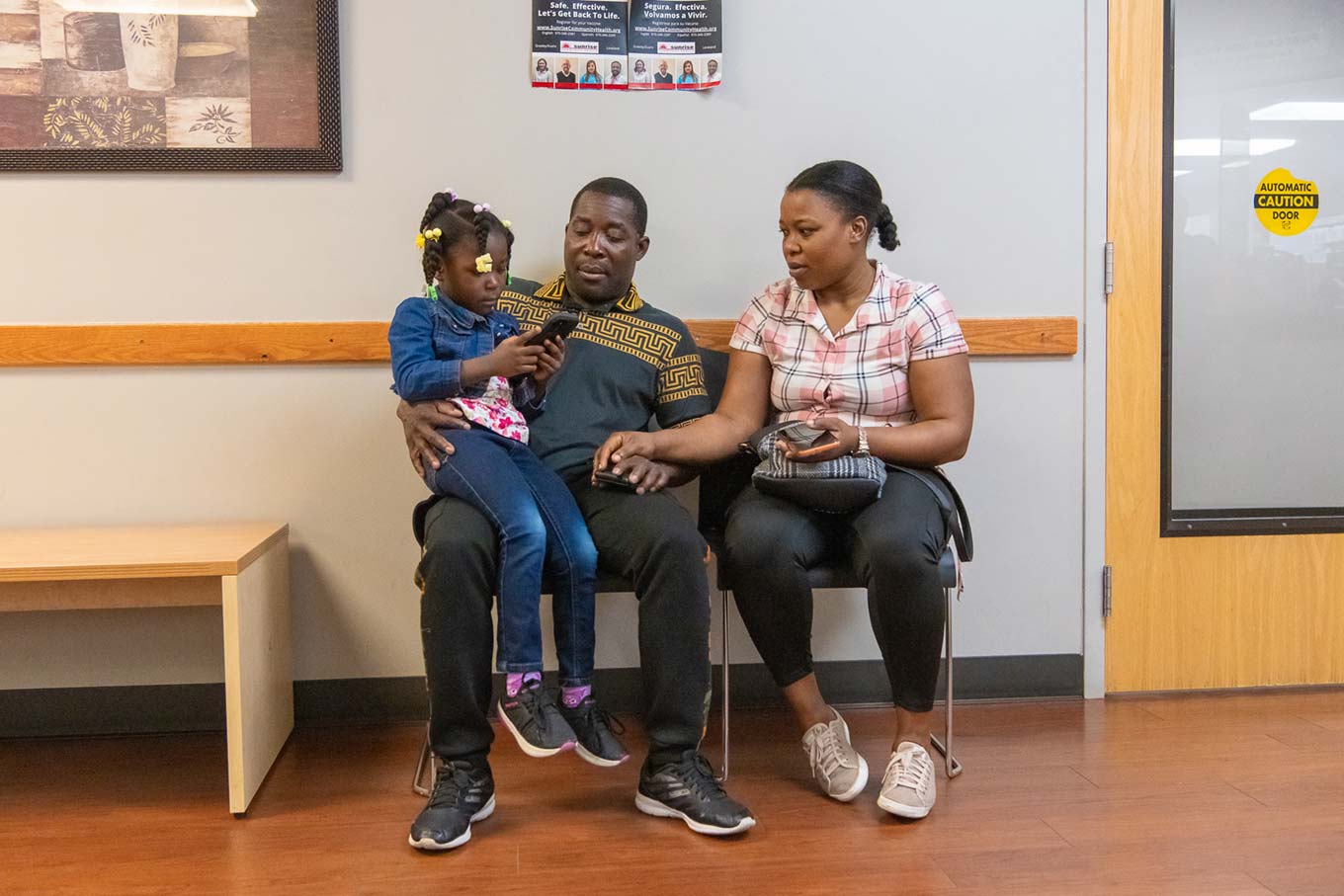
Tassy, her husband JN, and daughter Marlia, 5, wait outside a pharmacy for a prescription to be filled at Monfort Family Clinic on Wednesday, June 18, 2025, in Evans, Colo. Photo by Tanya Fabian / Special to The Colorado Trust
Tassy, her husband JN, and daughter Marlia, 5, wait outside a pharmacy for a prescription to be filled at Monfort Family Clinic on Wednesday, June 18, 2025, in Evans, Colo. Photo by Tanya Fabian / Special to The Colorado Trust
Yuliana scrambled to get her daughter the help she needed as her daughter’s mental health worsened. Yuliana said her daughter tried to kill herself multiple times. The mother did not know what to do or how to get her daughter help. Eventually, Yuliana found an inpatient facility where the girl could receive treatment.
“It’s a sorrow and a big absence, more as a mother, in that moment I had to take her to the rehabilitation center because in my house I had a lot of fear that she would grab whatever thing [was] in the kitchen—she could grab a knife … so I was like, ‘How do I help her? How do I help her?’ It was a big desperation,” Yuliana said.
Yuliana spoke to a reporter through a Spanish interpreter on a Monday morning in June from a bustling waiting room at the Monfort Family Clinic in Evans, which borders Greeley in Weld County.
(Collective Colorado is not using the full names of Medicaid clients interviewed and photographed in this story to protect their identities due to the current political climate.)
Yuliana said she’s grateful her daughter is now thriving and that, because they are Medicaid clients, the family is not buried in debt from that dark period.
“It was a freedom for that [financial] part,” she said. “It was a bit of less worry because in that moment I had all of my attention only focused on my daughter.”
Yuliana and her family could be among the thousands of Coloradans who will lose health insurance if proposed federal Medicaid cuts are passed, and clinics with high volumes of Medicaid clients may be forced to close or limit services.
A proposed bill in the U.S. Congress would add work and administrative requirements for Medicaid coverage—likely resulting in disenrollment for thousands of Coloradans—to fund tax cuts for some of the wealthiest Americans. The so-called “One Big Beautiful Bill Act” has passed the House of Representatives and is under review in the Senate. Colorado representatives in the House voted along party lines, with Democrats against the legislation and Republicans in support of it. Colorado’s two Democratic senators are also expected to vote against the bill in the Senate.
The Urban Institute estimates that between 95,000 and 108,000 Coloradans could lose Medicaid coverage because of this legislation. Yale University researchers calculated that if millions of low-income people got kicked off Medicaid and Medicare, 11,300 people would die each year nationwide because of it. The bill would also remove tax credits that, if not applied to Colorado’s open insurance market, could push thousands more off other health insurance policies.
Sunrise Community Health operates 14 of the 247 community clinics in the state that help underserved populations. Community health centers are designed to provide preventive health care to some of the state’s lowest-income residents. As of 2024, the clinics served 857,000 people in about two years throughout Colorado, according to the Colorado Community Health Network, which represents 21 community health centers, including Sunrise.
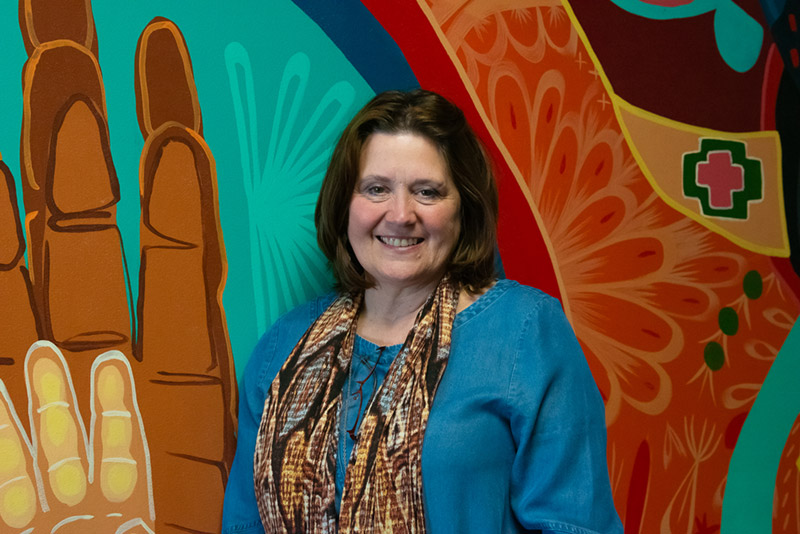
Mitzi Moran, chief executive officer of Sunrise Community Health, poses for a portrait on Wednesday, June 18, 2025, at the Monfort Family Clinic in Evans, Colo. Photo by Tanya Fabian / Special to The Colorado Trust
Mitzi Moran, the chief executive officer of Sunrise, said all those clinics statewide have a common goal: “Affordable access to quality care for all.” Additional resources from the federal government help achieve that mission, she added.
Ross Brooks is president and chief executive officer of the Colorado Community Health Network, which represents community health centers across Colorado. He believes that removing access to health care for people who cannot afford it without insurance “doesn’t feel very American.”
Brooks is concerned about the ramifications of people deferring or skipping vital health care if they no longer have coverage—for example, not getting tests to follow up on diagnoses, or not reaching out for mental health support.
“That keeps me up a lot, that folks won’t reach out or won’t seek care because they’re worried about the cost of it, because they are no longer insured,” Brooks said. “The data is brutal. The data says if you’re uninsured, you’re more likely to die sooner.”
Researchers have repeatedly found that uninsured people have higher mortality rates than those who have health insurance. A June 2025 study of the pending federal legislation estimates that 16,600 people could die because they will lose access to care.
Moran said in the nearly 27 years she has worked for Sunrise, she’s noticed the same pattern: When people do not have insurance, they have to make tough decisions about whether to pay for rent, food or health care.
“They can’t manage their chronic disease very well without appropriate medication, so then they get sick, and that just spirals, right?” she said. “So now they’re ill. Now they can’t work. Now they can’t care for their family. So access to affordable coverage, which gets you to care, is key because people will seek care in a more timely manner.”
Marisol held a cooing baby in a Sunrise waiting room in June, standing and rocking her young daughter as they waited for an appointment. Through a Spanish interpreter, she said she relies on Medicaid to take care of her kids.
“[I] imagine if my daughter didn’t have Medicaid—well, I don’t know what I’d do,” Marisol said. “I imagine that to visit the doctor, I would think about how am I going to do it, and going to the doctor, it’s all very expensive.”
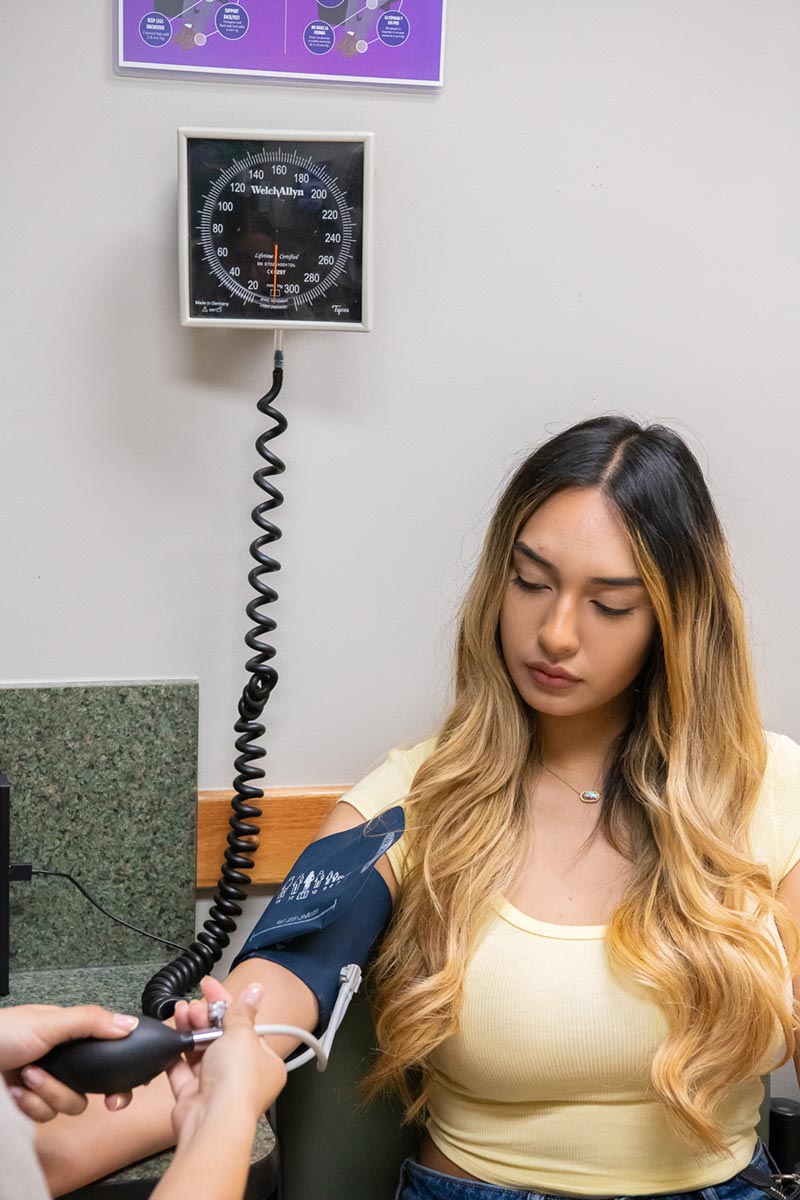
A medical assistant checks Ingrid’s vital signs in an exam room at Monfort Family Clinic on Wednesday, June 18, 2025, in Evans, Colo. Photo by Tanya Fabian / Special to The Colorado Trust
There are strict income limits for people to qualify for Medicaid. A single adult working full–time in Colorado cannot make more than $1,735 a month, or about $10 an hour, according to the Colorado Department of Health Care Policy and Financing, which oversees Medicaid in the state.
Immigrants in the U.S. without legal status are not eligible for Medicaid, but Colorado provides state funding to help undocumented immigrants pay for health care. The pending federal legislation would penalize states that provide this type of support, cutting millions in federal funding.
Cuts to Medicaid will destabilize clinics
About 1 in 4 Medicaid clients in Colorado have received care at community health centers, according to federal data, Colorado Community Health Network and the Geiger Gibson Program in Community Health at The George Washington University.
Two of every three clinics operate with negative margins, which Ross said means that facilities spend more taking care of people than they are reimbursed for from insurance or grants. People who cannot afford to pay in full can pay a fraction of the cost on a sliding scale, and clinics often lose money on these visits.
Ross said any Medicaid reimbursement cuts could lead to “heartbreaking” decisions, such as clinics being forced to lay off staff, reduce services or shut down completely. He said rural clinics are particularly vulnerable.
“I fear if this bill goes through, we’re going to be to the point where clinic systems are going to be forced to just close full clinics altogether,” Ross said.
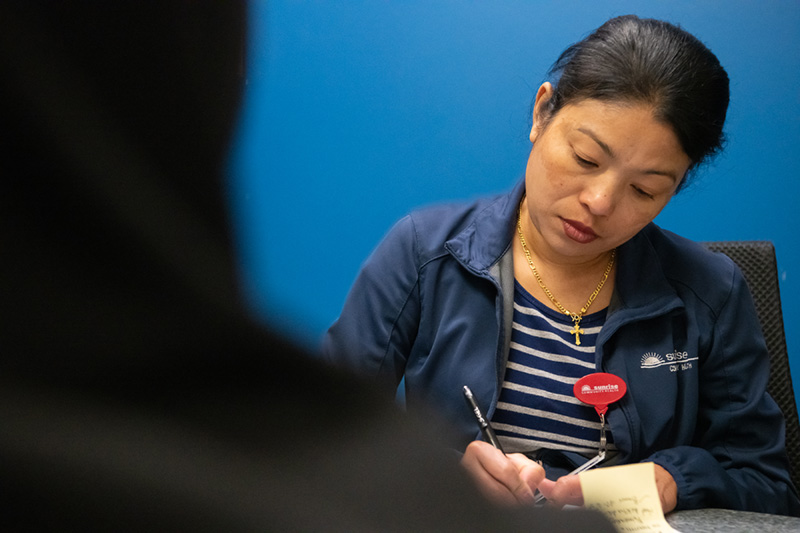
Interpreter Paw Hsa helps a client fill out paperwork on Wednesday, June 18, 2025, at Monfort Family Clinic in Evans, Colo. Photo by Tanya Fabian / Special to The Colorado Trust
Moran said Sunrise Community Health will be able to weather the cuts, but she is unsure if her colleagues at other clinics will be able to do the same.
“We will be faced with tough choices,” she said. “We may have to downsize our programming. We certainly won’t be able to expand to meet the growing need. It’s a bad deal.
“The most important part, though, is that it is a bad deal for the people,” she added. “I don’t know how someone who’s making $10 an hour is going to be able to afford to buy health insurance. It’s just impossible.”
Moran said that the providers’ schedules are frequently full, and the walk-in clinic fills up by lunch. According to the organization’s annual report, Medicaid provided Sunrise Community Health with 43% of its funding in 2024.
Marisol said she cannot afford private health insurance and utilizes the clinic’s sliding scale when she needs to see a doctor.
“I almost don’t visit the doctor much now, truthfully, unless I have to, but everything is good,” Marisol said.
The Colorado legislature voted this year to give interest-free loans worth millions of dollars to “safety net providers” for five years, starting with $25 million during the 2025-26 fiscal year. If passed, the federal legislation would “reduce federal Medicaid spending by $793 billion” nationwide.
While Brooks is grateful for the state’s cash infusion, it will only go so far.
“It will help stabilize the community health centers for the next three years if the feds don’t turn around and gut Medicaid,” he said.
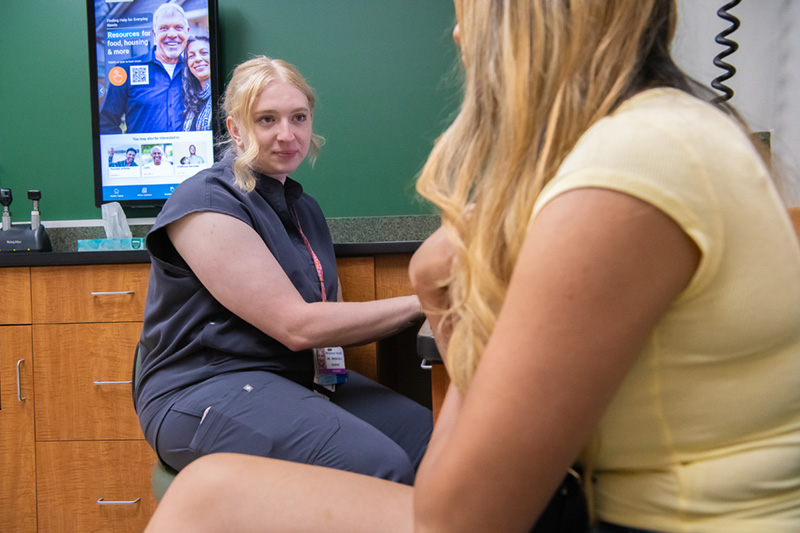
Dr. Samantha Driscoll speaks with a client in an exam room on Wednesday, June 18, 2025, at Monfort Family Clinic, in Evans, Colo. Photo by Tanya Fabian / Special to The Colorado Trust
In Larimer County, an average of 70,947 people are enrolled in Medicaid monthly through the state’s Health First Colorado program. More than half a million dollars has been spent mostly on long-term care and pharmacy claims, according to statewide data.
Tom Gonzales, Larimer County’s public health director, said he is concerned about who will be impacted by the proposed cuts. He said the community health clinics help prevent people from “falling through the cracks”—a term often used to describe people who do not make enough to afford commercial health insurance but make too much to qualify for Medicaid.
“These individuals are going to really struggle to be able to get access to preventive health care, and they’re going to be looking to other clinics, hopefully,” Gonzales said. “What I’m afraid of are those clinics that can provide service, they’re going to have waiting lists and delays. That’s going to be several months before they can come in and get access, which again will create another barrier for them to get basic preventative health care.”
Yuliana said she has relied on Sunshine Community Health to care for her and her family since 2017. She loves how “attentive” and “hospitable” the providers are.
There are other families with children who are suffering and need Medicaid services, Yuliana said.
“It’s more than just an individual’s health, it’s the health of our family, our kids,” she said. “The United States should not [make cuts to Medicaid]. They shouldn’t do it. It’s sad.”
If you or someone you know is struggling with their mental health or needs someone to talk to, call or text 988 for help or go to 988Colorado.com to speak with someone live.